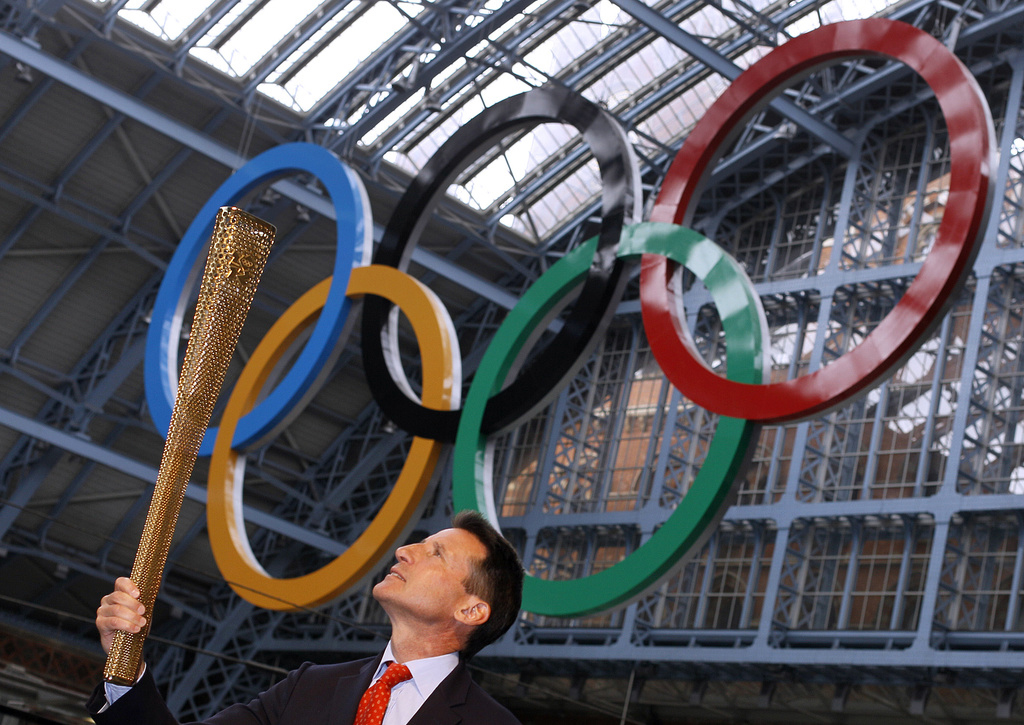
Sebastian Coe defends Olympic ticketing system

London 2012 Olympic Games chair Sebastian Coe has told swissinfo.ch he understands public disappointment at missing out on tickets, but demand has been “extraordinary”.
There has been plenty of frustration in Britain over the online scramble for tickets for next year’s Olympics. Coe was in Lausanne on Monday to share insights into organising the Games with a 500-strong audience at the IMD business school.
“No event in world history has sold so many tickets so quickly,” the London 2012 organising committee (Locog) chairman told the conference audience.
London 2012 was flooded with 22 million requests from 1.9 million people when 6.6 million tickets originally went on sale to the public on March 15.
Only 700,000 people were successful – or 36 per cent – in buying three million tickets in this first round.
There has been criticism of the ballot system, the prices, which range from £20 to £2,012, and the fact that money was taken from accounts before applicants knew which events they have secured.
On June 24 the 1.2 million people who missed out on the first round of allocation were given an exclusive opportunity in a ten-day first-come, first-served sale to pick up 2.3 million unsold tickets.
But it has emerged that of the 150,000 applications so far processed, about ten per cent have ended up with nothing at all, despite being told initially they had secured tickets.
“I don’t for one minute downplay the disappointment of those who, at this stage, haven’t got tickets,” Coe told swissinfo.ch.
Defence
The 1980 and 1984 Olympic 1,500 metres champion defended the allocation system and strategy, which he said was based on “full venues”, affordable pricing – two-thirds of the tickets are under £50 – and a Britain-wide Olympic experience.
“It’s comforting as chair of the organising committee that we have almost sold out all tickets a year in advance,” said the 54-year-old.
Under the International Olympic Committee’s (IOC) ticket distribution model, 12.5 per cent are reserved for sponsors and the so-called “Olympic family”. Of the 8.8m total, the rest are divided as follows: 75 per cent to the British public and 12.5 per cent overseas.
Coe told the audience that the challenge of organising the London Games “was only just beginning”.
“It’s about delivering, getting young people into sport in a smart and creative way, the regeneration of East London, making it tangible and understandable and using the London Para Olympics [which follow the main Games], to challenge public perception about disabilities,” said the chairman.
London legacy
The legacy of an Olympic Games was not something that just “fell into your lap as you talked a good game” but had to be enshrined into the bid, said Coe.
He reeled off a list of tangible examples, including the 80,000-seater Olympic stadium. Premier League football team West Ham United are vying with Tottenham Hotspur to occupy the stadium after the Games.
Half of all new housing has been sold in the newly regenerated areas, and the futures of the Aquatic Centre and Velodrome are secure, he noted.
The government is also talking of using the Olympic Games to energise competitive sport in schools, 750,000 kids now play sport thanks to our sponsorship partnerships and Adidas will build 51 inner-city play areas.
Coe said the Olympic brand remained “under challenge”, however.
“In the late 1990s the average age of those watching the Games was 34-35. Now it’s tipping towards 50. In marketing terms that poses challenges of sustainability,” said the former athlete.
“When putting together the bid we really needed to understand who the people were we were putting the Games on for.”
Advice for Swiss
Switzerland, home of the IOC, hosted the winter Olympics in St Moritz in 1928 and 1948, but later Swiss bids for 2002, 2006 and 2010 failed. It is once again thinking of bidding for the Winter Olympics of 2022 at the earliest.
When considering its application, Coe said the Swiss bidding team had to remember the process was “a very long haul”. It had taken the London bid almost seven years.
“You also have to really understand why you are doing it and you need to be politically seamless on that,” he told swissinfo.ch, adding that the London bid had experienced changes of British government and London mayor.
“You also have to remember that the most challenging stakeholder is not the government, the IOC or national Olympic committee but the 60 million people in my case, who all have a proprietary interest in the Games and think they can all pick the English Olympic football team.”
IMD was established in January 1990 as the successor to two previously independent business schools: IMI, founded in Geneva by Alcan in 1946, and IMEDE, founded in Lausanne in 1957 by Nestlé.
IMD is a leading provider of executive education for large and medium-sized international businesses and individuals. Every year around 8,000 executives, representing around 100 nationalities, attend the 20 executive development programmes.
The business school was placed third worldwide in the Financial Times’ executive education rankings for 2010, behind Harvard Business School and HEC Paris.

In compliance with the JTI standards
More: SWI swissinfo.ch certified by the Journalism Trust Initiative






























You can find an overview of ongoing debates with our journalists here . Please join us!
If you want to start a conversation about a topic raised in this article or want to report factual errors, email us at english@swissinfo.ch.